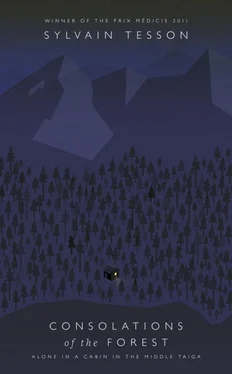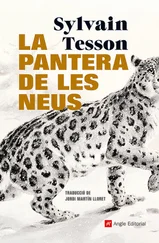‘Sounds good.’
The sight of V.E. busy whacking a frozen fish with a hammer while standing at a kitchen table that hasn’t been cleaned since the end of the Soviet Union delights me. Russians never put on airs and the fish is delicious.
‘Anything happen in the world over the last three weeks?’ I wonder.
‘No, it’s quiet, the Muslims are hibernating.’
7 MARCH
A day on the lake, fascinated by the designs in the icy mantle. Into that frozen body the cracks and fissures weave electric layers whose current spreads with hectic abandon: the lines retract, join up, veer away. The ice has absorbed the energy of the shocks by distributing it along sheaves of ‘wiring’. Staggering blows rend the silence and are borne along as the echo of an explosion dozens of miles away. The noise vents itself through these networks of veining. As the sun’s rays are refracted in the cross-connections, the skein begins to glow. Light irradiates the veins of turquoise, infusing them with trails of gold. The ice convulses. It is alive and I love it. The pearly coils trace knots resembling neuronal tissues or photos of stardust clouds. The map of this meshing would be psychedelic. Without drugs or wine, my brain perceives hallucinatory sequences as the world offers glimpses of an unknown writing. The patterns stream by as if born in an opium dream, for nature refuses us even the consolation of projecting our own brand-new images on this psychedelic screen.
This oeuvre will vanish in May, engulfed by the thaw. The ice of Baikal is a mandala that will lose its patient design to warmth and the wind.
Twelve and a half miles south of Zavorotni, I spend the night in the cabin of Bolshoi Solontsovi. It’s a dilapidated shelter used when needed by the foresters of the reserve. Three years ago I spent two days here with Maxim, an ex-convict to whom the authorities had given a second chance. They’d made him an inspector. He had the face of a brute and a gentle, sweet smile. He was moping terribly in his cabin, and his life was no picnic. A bear had been prowling the clearing for days, trapping him inside the cabin. ‘I’ve been reduced to peeing in my teapot,’ he’d complained. His superiors hadn’t wanted to risk issuing a rifle to a former drug addict fresh from the jails of Irkutsk. In the evening, the bear had come and stared at us from the door. ‘Fucking hell, I was safer in prison,’ Maxim had fumed.
Since then, the bear has been murdered, Maxim has relapsed, is serving out a new sentence, and the cabin of Bolshoi Solontsovi is empty once more.
I play chess with myself. The last streak of daylight shoots through the window, ricocheting off a knife blade. In spite of a mad, heroic charge, White loses. On the wooden beams, photos: nude girls with smooth white skin and hefty breasts pose in positions a bit too overdone to inspire any conversation. Already it’s impossible to see a thing; nightfall has won out.
8 MARCH
On the ice. I reach the weather station at Solnechnaya during the afternoon. Back in the time of the defunct USSR, a trim little village stood on a deforested shoulder of the mountain. Today the remains of the hamlet harbour two people: Anatoli, an inspector, and Lena, his ex-wife. They recently separated and live in two neighbouring izbas, like a set of porcelain dogs at the end of the world. A chaotic mess of jagged ice makes it hard to reach the station, and, when I knock on Anatoli’s door, there is no answer. I push the door open. Sunlight floods into the room. There are empty tin cans on the floor, empty bottles beneath the table and a body on the couch. I had forgotten it was 8 March, Women’s Day in Russia. Anatoli has been celebrating. Lena will later tell me that he banged on her door all night shouting: ‘You’re gonna open up!’ A gentleman should always observe Women’s Day.
I wake him up. He smells of formaldehyde, ether and cabbage. He stands up and falls down.
‘It’s my rheumatism,’ he says, to save face. ‘Very painful.’
‘Yes, the damp weather,’ I agree.
Anatoli spends the afternoon drifting along the steep flank of the mountain. These weather stations are launching pads to psychiatric wards. Ever since Stalin’s time, they stud the territory from Belarus to Kamchatka. Spreading such posts around was a way to both occupy the emptiness and maintain a supply of citizens who would warn Moscow if a fascist turned up… or if anyone else felt an itch to protest against something. In izbas all kitted out with the same recording equipment, meteorologists live in couples or groups of four or five. Every three hours, they go outside to record the data they will radio to their base. Their time is not their own, and the inflexible routine fosters mental confusion. This no-exit situation becomes a circus of disorders: the sufferers drink, tear into one another, develop mental pathologies. Once in a while, a disappearance interrupts their routine. On an island station in the Laptev Sea north of Siberia, a meteorologist’s felt boots were found. Conclusion: wool gives polar bears indigestion. A few decades ago, here in Solnechnaya, a station master hated by his men vanished into thin air one winter’s night out in the forest. The administration hushed the matter up.
I leave Anatoli when Lena invites me to tea at her place. She has the handsome face of a Flemish fishwife, with blue, almond-shaped eyes and a pert nose. We have three hours before I must set out again. The tea steams and Lena holds forth. She arrived at the station when she was sixteen and wouldn’t leave here for anything.
‘I don’t like asphalt. In the city the tar makes my feet hurt and money evaporates.’
‘And the job?’
‘I like it. Except for the wild animals. The recording equipment is fifty yards from the house and at night, that’s a really long way, so I run. But I’m not complaining.’
‘Why not?’
‘Because there are stations where the equipment is more than half a mile away!’
‘No animal attacks?’
‘Yes, wolves.’
‘When?’
‘The second time I saw the wolf, here, was 6 June. I go out to the field at eight o’clock and see the cows running home past me. I thought the ox had frightened them. While I’m coming back, off in the distance I think I see our dog Zarek. I turn around – Zarek is right there. So it’s a real wolf, up ahead of me! The cows had already gone around behind me again, so I run at the wolf with a big stone. The wolf comes closer, I see its grin. I’m throwing stones at it. So the cows, maybe they felt ashamed, they do another U-turn and come back to me!’
‘The cows came back!’
‘And the ox as well. So then the wolf begins to retreat, still grinning, as if it were urging me to follow it. And I do, throwing more stones: I pluck up my courage, and I have a whole herd behind me!’
‘Good for the cows.’
‘Yes, but another year, we had losses.’
‘More wolves?’
‘No, the bears.’
‘Bears?’
‘I hear the dogs howling. Like you wouldn’t believe. I run outside to see. Afterwards, some women said I was crazy to have gone out alone. If the bear had still been there it would have killed me. So I go out, I see the ox lying on the ground, dying. His legs were broken, gashes on the muzzle, and a big chunk of flesh torn from around the spine. The bear had broken his legs so he couldn’t run away.’
‘The poor ox!’
‘I turned straight around and ran home. I called Palitch, a friend who’d happened by. We had to do something. Palitch finished off the ox with a knife. Me, I didn’t eat any of that meat. The next day, we found the cow…’
‘The cow?’
‘The bear had already stashed her before I arrived. A few hundred yards from where it attacked the ox. It had made a tomb for her… Her belly was slashed open. She’d been pregnant. You could see the calf spilling out, and the cow’s muzzle was torn off. Cows, well, I get attached, as if they were children. I had a nervous breakdown that year.’
Читать дальше












